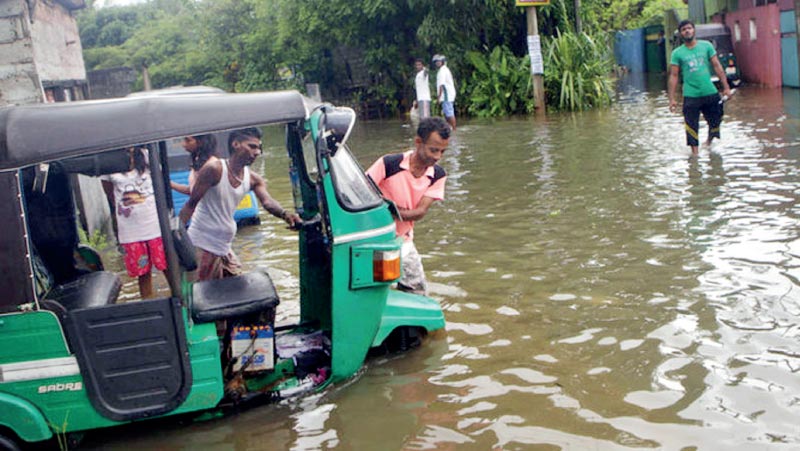Thursday Jan 08, 2026
Thursday Jan 08, 2026
Friday, 17 November 2023 00:20 - - {{hitsCtrl.values.hits}}

The future global financial centre, is ready neither for the sun nor the rain
|
 The ceaseless rain washes away the accumulated grime and dust of Colombo only to expose its dilapidation – blocked noisome drains, pot-holed roads, broken pavements, fallen trees and the hanging cables that define the capital city; a city with a mighty ambition nevertheless – a financial centre for the whole wide world!
The ceaseless rain washes away the accumulated grime and dust of Colombo only to expose its dilapidation – blocked noisome drains, pot-holed roads, broken pavements, fallen trees and the hanging cables that define the capital city; a city with a mighty ambition nevertheless – a financial centre for the whole wide world!
Before the deluge, Colombo was scorching, the sweltering heat made worse by the agonising humidity. Dust and soot covered the shabby streets, the trees withered, the grass turned brown. With reservoirs running low there were warnings of water cuts. To alleviate their suffering, the city dwellers looked for fans and air-conditioners only to learn that the severely restricted imports had impacted their availability, and even if the appliances were found, the huge depreciation of the rupee made them prohibitive. Not only the humans, even the animals suffer in the heat. Usually the stray dogs are active, scouring the streets for morsels of food thrown away. Unable to cope with the merciless heat they sought relief even under parked cars, a dangerous shade. The heat kept the people away, food was scarce, sometimes the dogs licked the dry drains for moisture.
Then came the deluge, drenching the city day after day. While the heat had enervated the spirit, the grimy sludge brought about by the unbroken rain discouraged any venture. It is either too hot or too wet, trapped by the elements the city dweller endures in a decrepit city; his leaders meanwhile talk of development, financial centres, creating another Singapore or even the nation’s atavistic greatness.
Living in a crumbling Third World city, for the Colombo resident the last evocation of times lost in the mist of history is the most thrilling, when our ancestors flourished in sun-kissed valleys blanketed with verdant paddy fields. The truth may not be so glorious; the resulting human specimen is unremarkable. However, in the stupefaction of an eroded humanity such reflected glory must be clung to, for it speaks of skills and abilities sorely lacking, even unimaginable now.
The fierce sun, the torrential rain, the wearing heat are what makes the tropics; the unvarying weather cycle in this part of the world. Yet Colombo is seemingly taken by surprise; the burning sun paralyses all activity while the rains that follow flood the city.
No effective steps have been taken to mitigate the heat, since 1948 – no new parks, no tree lined streets and no restrictions on the concrete monstrosities coming up cheek by jowl! Colombo now is a warren of dirty alleys and ugly apartment blocks. The regulations allow for buildings even on something as tiny as 5 perches. Regulations that may suit temperate climates will not suffice for the tropics; without open spaces, fresh air, trees and greenery the city becomes a hell-hole.
And when the skies open everyone runs helter-skelter, the roads are flooded, roofs leak, traffic is blocked, schools are closed and attendance at workplaces drops drastically.
The future global financial centre, is ready neither for the sun nor the rain.
It is tempting to lay the blame for the pitiful state of our capital city solely on the politicians. However, such an attitude only grasps a partial truth. Not every road, drain, pavement and roof is interfered with by politicians. There are numerous city planners, architects, engineers, supervisors leading an army of workers of the Municipality and the Works Department. Yet, nearly every road is poorly done, every pavement is uneven and every roof is leaking.
If, an example is needed for the indolence of our municipal services, look at what is happening down Chitra Lane, Colombo 5, an area familiar to me. This is an important arterial road feeding traffic to main roads like Kirula Road, Park Road and Greenland’s. About a month ago I noticed a huge crater at the Chitra Lane/Kirula Road junction, completely blocking through traffic. As a result, not only the residents of the area, even the motorists are terribly inconvenienced, having to find alternate routes, adding to the already heavy traffic on those roads. These rainy days the chaos thus created on the alternate roads is horrendous. Needless to say, the many small businesses along Chitra Lane are facing ruin, their customers unable to come down the road.
On closer examination, I realised that this crater was purposely dug, perhaps to attend to water or drainage pipes in the area. There are several monstrous machines parked nearby, backhoes and excavators, like frozen dinosaurs they stand motionless. Considering the disruption the closure of Chitra Lane is causing to thousands of people, I would have thought this place would be a hive of determined workers. Just the opposite, there is no one there, only another paralysed worksite of a rudderless organisation.
A three-wheel driver who generally parks his taxi opposite this location told me that occasionally a few people come there in two or three vehicles. They are driven to the site, there is a driver for each of these Government transport vehicles. Imagine, each vehicle with a designated driver who studiously maintains a log book for the car. They may lack other skills, but our public sector has a rare capacity for bureaucracy. It is an acknowledged fact that pilferage, bogus overtime claims and other scams are rife in transport departments.
Of those thus transported to the site, one gets on a backhoe and makes a few moves while the others apparently supervise him. Even the three-wheel driver, saw the ridiculousness of the exercise. He described the supervisors with a certain amusement: “They are dressed somewhat formally, wanting to appear like gentlemen (Mahathru – a much desired aspiration), long sleeve shirts and well creased trousers. They observe the pit from a distance, afraid of mud accidently landing on their clean clothes. When it starts to drizzle, they all run to their vehicles and go away.”
That is our municipal works department at work.
In this 21 Century when whole cities come up in a matter of months, what is happening at Chitra Lane, truly belongs to the dinosaur era. In fairness, I cannot blame this comedy on the politicians alone.
Looking at the recent histories of newly independent nations, it is apparent that a people’s collective destiny is determined by their own inherent attributes and attitudes. In Sri Lanka, the common narration is only about self, everything is measured by its own standards, a comparison with itself; leaders are compared to previous leaders, workers are measured relative to others in the work gang, and any product or creation is valued in relation to similar local endeavours. As a result, a failed system, failed ideas and a failed people have become the yard stick. Meanwhile, every other country has progressed much faster and further; better leadership, higher productivity and much greater quality and innovation coming from them.
No, we will not compare ourselves to other countries. It is too humiliating.
The gaping hole on Chitra Lane is now on its second month.